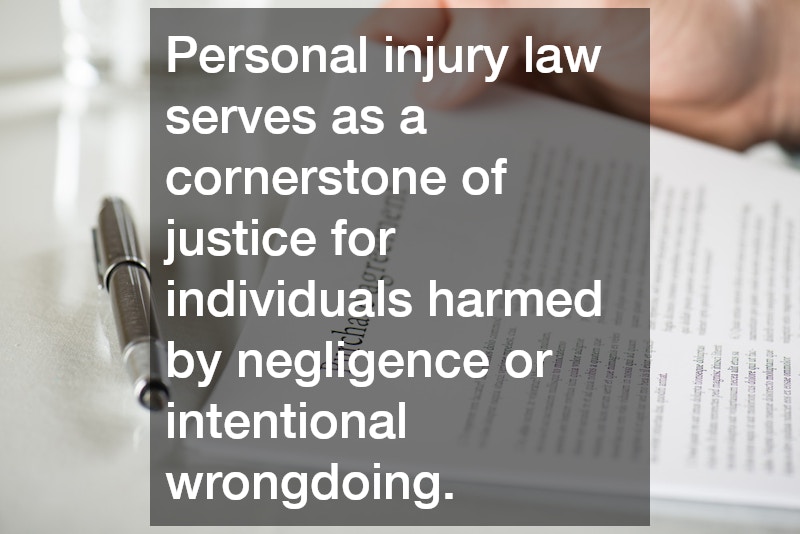Personal injury law is one of the most critical areas of the legal system, offering protection and compensation to individuals harmed by another’s negligence or intentional wrongdoing. From car accidents and workplace injuries to medical malpractice and defective products, this field ensures that victims receive justice and financial restitution for their losses. In this article, we’ll explore the foundations of personal injury law, how claims work, the types of compensation available, and the importance of hiring a qualified attorney.
What is Personal Injury Law?
Definition and Scope
Personal injury law, often referred to as tort law, allows individuals to seek legal remedies when they suffer harm due to another party’s actions or failure to act responsibly. Its goal is to restore the injured person to the position they were in before the incident occurred—financially, physically, and emotionally—by providing compensation for their losses.
Types of Personal Injury Cases
This area of law covers a wide range of cases, including:
- Auto accidents: Injuries caused by negligent drivers are among the most common personal injury claims.
- Slip and fall incidents: Property owners can be held liable if hazardous conditions cause someone to be injured.
- Medical malpractice: When healthcare professionals fail to meet the standard of care, patients can pursue compensation for resulting injuries.
- Product liability: Manufacturers may be responsible for harm caused by defective or unsafe products.
- Workplace injuries: Employees injured on the job may be eligible for compensation through personal injury or workers’ compensation claims.
Historical Background
Personal injury law has its roots in English common law, which evolved to provide a legal framework for holding individuals accountable for harm caused to others. Over time, statutes and precedents have expanded its reach, incorporating modern concepts like consumer protection, medical accountability, and corporate liability. Today, personal injury law continues to evolve alongside advances in technology, transportation, and medicine.
How Does a Personal Injury Claim Work?
Filing a Claim
The process begins when an injured person (the plaintiff) files a claim against the party believed to be responsible (the defendant). Key steps include gathering evidence such as medical records, photographs, police reports, and witness statements. Most personal injury lawyers offer free consultations and work on a contingency fee basis—meaning they only get paid if the case is successful.
Legal Procedures and Timelines
After filing, both parties engage in a process called discovery, where evidence is exchanged and depositions may be taken. Most states impose a statute of limitations, typically one to three years from the date of the injury, within which a claim must be filed. Timelines vary depending on the complexity of the case, but most claims take several months to a few years to resolve.
Settlement vs. Trial
Many personal injury cases are settled out of court through negotiation. Settlements are faster, less expensive, and often less stressful for all parties involved. However, if a fair settlement cannot be reached, the case proceeds to trial, where a judge or jury determines liability and damages.
What are the Types of Compensation Available?
Compensatory Damages
Compensatory damages are designed to reimburse the injured party for actual losses. They are divided into two categories:
- Economic damages, which include medical bills, lost wages, and property damage.
- Non-economic damages, which cover intangible losses like emotional distress and reduced quality of life.
Punitive Damages
In cases involving egregious negligence or intentional misconduct, courts may award punitive damages. These are not meant to compensate the victim but to punish the wrongdoer and deter similar behavior in the future.
Pain and Suffering
Pain and suffering damages address the physical pain and emotional anguish caused by an injury. Courts may use a multiplier method—calculating these damages based on the severity of the injury and the total economic losses—to ensure fair compensation.
Do I Need a Personal Injury Lawyer?
Benefits of Hiring an Attorney
Having an experienced personal injury lawyer can make a significant difference in the outcome of a case. Attorneys understand the complexities of the law, handle communication with insurance companies, gather evidence, and negotiate settlements. They also ensure that claims are filed within legal deadlines and that clients receive the maximum compensation available.
Choosing the Right Lawyer
When selecting a personal injury lawyer, consider their experience, success rate, and client reviews. Look for attorneys who specialize in your type of case—such as auto accidents or medical malpractice—and who offer transparent communication throughout the process.
Cost and Fees
Most personal injury attorneys operate on a contingency fee basis, meaning they only receive payment if they win or settle the case. Typical fees range from 25% to 40% of the settlement, depending on the complexity of the matter. This arrangement allows injured individuals to pursue justice without upfront costs.
How Does Insurance Affect a Personal Injury Case?
Role of Insurance Companies
Insurance companies often play a central role in personal injury cases. They are typically responsible for paying compensation on behalf of the at-fault party. However, insurers are also profit-driven businesses and may attempt to minimize payouts.
Dealing with Insurance Adjusters
When communicating with insurance adjusters, it’s important to remain cautious. Avoid making recorded statements or signing documents without consulting your attorney. An experienced personal injury lawyer can negotiate effectively to ensure that you receive fair compensation.
Personal injury law serves as a cornerstone of justice for individuals harmed by negligence or intentional wrongdoing. By understanding how claims work, the types of compensation available, and the crucial role of legal representation, victims can better navigate the path toward recovery. With the help of an experienced personal injury lawyer, you can protect your rights, manage insurance challenges, and pursue the compensation you deserve.





